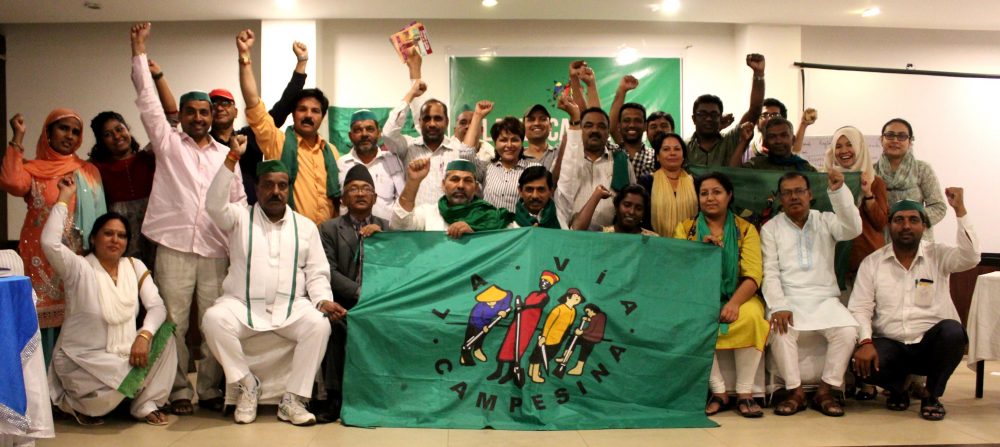LVC South Asia members pledge to strengthen regional and international solidarity

Farmers’ organisations in South Asia, who are also members of La Via Campesina, held a regional meeting in New Delhi from the 30 March – 01 April, making a collective commitment to unify the struggles in the regions and to also strengthen the international solidarity across continents.
Members from Sri Lanka, Nepal, Bangladesh and India took part in the 3-day long meeting. Representatives from Pakistan could not attend the three day meeting due to an inhuman visa regime that India and Pakistan have built against the citizens of the both countries. A message from the comrades in Pakistan were read out during the meeting, where all members joined in condemning these bureaucratic processes that stand in the way of people’s exchanges and denying free movement.
On the opening day, all the attending members held a minute of silence in the memory of K S Puttannaiah, the iconic peasant leader of KRRS and Asma Jehangir, a close ally of the peasant movements in South Asia and a leading human rights lawyer and activist of Pakistan – both of whom passed on in February this year. Several members fondly remembered the long and ardent struggle that both the tall leaders led and promised to take forward their fights for social justice in the region.
The first day was spent reflecting on the national and regional context that has precipitated the agrarian crisis affecting millions of peasant households. During the presentations, it was evident that the small farmers and peasants, in all the countries, were facing an oppressive state, which is in cohorts with the global neo-liberal regime that is more interested in fancy optics and empty promises, rather than addressing the real concerns of people and rural communities.
Allies of La Via Campesina South Asia were also present on the first day, when participants spent a considerable time looking at specific issues, such as the impact of the policies of WTO, the dangers of Bilateral and Regional Free Trade Agreements that are massively tilted against the interests of peasant communities and posing grave threat to the peasant way of life.
Members of the BDS movement in Palestine also joined the participants briefly, to present the ongoing struggle of Palestinian people to reclaim their land and resist the occupation of the Israeli forces. They spoke about the daily struggle of Palestinian farmers to cultivate in their own land, often destroyed and devastated by the occupying forces. La Via Campesina South Asia offered solidarity to the Palestinian struggle and encouraged more such exchanges between peasant communities to unify and strengthen the movement for justice.
In a tragic turn of events, though the participants in Delhi were unaware at the time, while the presentation was underway – back in Palestine 17 people lost their lives to firing by Israeli forces – in a grim reminder of the despicable situation that is prevailing in the region. Soon as they learned about the incident a day later, the South Asia members strongly condemned this act of murder and violence by the Israeli forces, latest in a series of such violations.
On the first day, friends of La Via Campesina also spoke about the repeated attempt by multilateral corporations and friendly governments to capture the peasant seeds system through the creation of seed laws and through attempts to harmonise these laws across the South Asia region. Such efforts of harmonisation would allow big multinationals to enter the market. So far the peasant movements in the regions have been resisting these attempts but the global forces of capital are making big strides in the region. The big mergers in Agribusiness, that threatens to monopolise the formal seed system was also noted with much concern.
There were also presentations made on the ongoing human rights violations by Transnational Corporations world wide, and the many resistances led by social movements. A brief overview of the ongoing negotiations for a legally binding treaty at the UN, that could hold these corporations accountable for their violations, was also given.
The second day was spent reviewing the agitations and campaigns carried out by each of the individual members to advance the struggles for justice. A considerable amount of time was also spent in reviewing the several international processes – such as the ongoing seed treaty negotiations, the discussions going at the Civil Society Mechanism within the FAO, the resistances against introducing climate smart agriculture and more. It was agreed that the regional members would make a concerted effort to translate these complex international negotiations down to the members of our peasant communities, in a systematic way.
On the third day, participating members also discussed ways to strengthen the ‘working collectives’ of La Via Campesina, which are internal mechanisms within the movement to follow and intervene in specific issues concerning the peasant community. It was noted that each member organisation will commit to dedicate atleast two people per issue and will take responsibility of disseminating the international process to the grassroots.
The youth and women members of the South Asia movements also held a brainstorm session on increasing the gender and generational parity within the leadership of the movement in the region. Decisions were taken to create equal representation at all levels of the movement and to ensure that younger people are trained politically to take forward the several inter-regional and inter-continental struggles forward, within and outside the movement.
Discussions were also held on developing a coherent communications strategy for the region and also in developing a collective system of communications with each member deputing a member to become the communications coordinator. Much emphasis was also laid on developing a network of volunteer interpreters and translators in the region, who could play a pivotal role in taking the messages of the global peasant movements to all the communities in the South Asian region.
A detailed report of each of the individual session is now being prepared and will be published soon.
